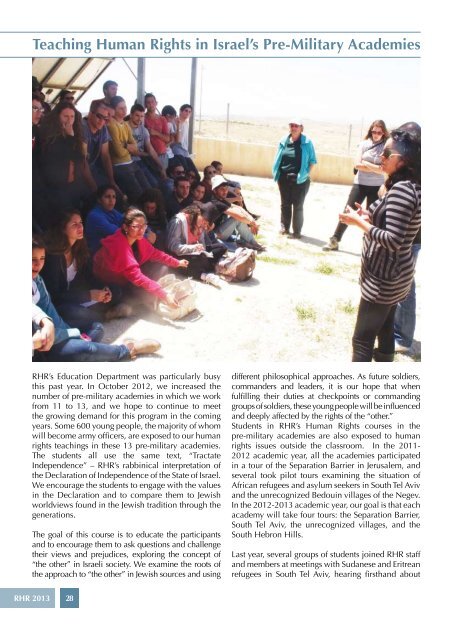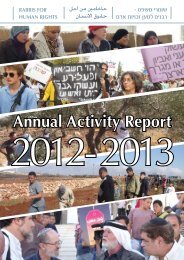Rabbis For Human Rights: The Annual Report 2012-2013
Rabbis For Human Rights: The Annual Report 2012-2013
Rabbis For Human Rights: The Annual Report 2012-2013
You also want an ePaper? Increase the reach of your titles
YUMPU automatically turns print PDFs into web optimized ePapers that Google loves.
Teaching <strong>Human</strong> <strong>Rights</strong> in Israel’s Pre-Military Academies<br />
RHR’s Education Department was particularly busy<br />
this past year. In October <strong>2012</strong>, we increased the<br />
number of pre-military academies in which we work<br />
from 11 to 13, and we hope to continue to meet<br />
the growing demand for this program in the coming<br />
years. Some 600 young people, the majority of whom<br />
will become army officers, are exposed to our human<br />
rights teachings in these 13 pre-military academies.<br />
<strong>The</strong> students all use the same text, “Tractate<br />
Independence” – RHR’s rabbinical interpretation of<br />
the Declaration of Independence of the State of Israel.<br />
We encourage the students to engage with the values<br />
in the Declaration and to compare them to Jewish<br />
worldviews found in the Jewish tradition through the<br />
generations.<br />
<strong>The</strong> goal of this course is to educate the participants<br />
and to encourage them to ask questions and challenge<br />
their views and prejudices, exploring the concept of<br />
“the other” in Israeli society. We examine the roots of<br />
the approach to “the other” in Jewish sources and using<br />
different philosophical approaches. As future soldiers,<br />
commanders and leaders, it is our hope that when<br />
fulfilling their duties at checkpoints or commanding<br />
groups of soldiers, these young people will be influenced<br />
and deeply affected by the rights of the “other.”<br />
Students in RHR’s <strong>Human</strong> <strong>Rights</strong> courses in the<br />
pre-military academies are also exposed to human<br />
rights issues outside the classroom. In the 2011-<br />
<strong>2012</strong> academic year, all the academies participated<br />
in a tour of the Separation Barrier in Jerusalem, and<br />
several took pilot tours examining the situation of<br />
African refugees and asylum seekers in South Tel Aviv<br />
and the unrecognized Bedouin villages of the Negev.<br />
In the <strong>2012</strong>-<strong>2013</strong> academic year, our goal is that each<br />
academy will take four tours: the Separation Barrier,<br />
South Tel Aviv, the unrecognized villages, and the<br />
South Hebron Hills.<br />
Last year, several groups of students joined RHR staff<br />
and members at meetings with Sudanese and Eritrean<br />
refugees in South Tel Aviv, hearing firsthand about<br />
their experiences in Israel. We also met with a Jewish<br />
resident of the Shapira neighborhood, as well as with<br />
the director of the Levinsky Garden Library.<br />
One student who participated in the tour commented:<br />
“<strong>The</strong> refugee problem is a humanitarian one; the<br />
situation is in flux and it is difficult to deport them back<br />
to their original countries. <strong>The</strong>y feel like citizens of the<br />
land, joining youth groups such as the Scouts, and they<br />
learn Hebrew.” Upon meeting with Margaret, one of<br />
the social activists from the Shapira neighborhood,<br />
the student wrote that, “<strong>The</strong> situation is insane.<br />
<strong>The</strong>re is a lack of preschools, a lack of space, a lack<br />
of solutions to the distress of the foreign workers’<br />
children. Educationally, the problem is even more<br />
severe – there are not enough schools, and there is no<br />
capacity to absorb such a large population. <strong>The</strong>re is<br />
no investment in infrastructure, in lighting, and there<br />
is no secular elementary school – parents are forced<br />
to send their children farther away. Margaret lives<br />
on a relatively middle-class street. She contends that<br />
the boundary between the building and the street has<br />
blurred, and the situation is chaotic and untenable.<br />
<strong>The</strong>re are alcohol and drugs everywhere, to the point<br />
of public nuisance. <strong>The</strong> Shapira neighborhood is a<br />
microcosm of the whole migration issue. <strong>The</strong> place<br />
feels like a garbage dump.”<br />
We also took each pre-military academy on a tour of<br />
the Separation Barrier in Jerusalem, contrasting Israeli<br />
security concerns with the challenge of upholding the<br />
<strong>Human</strong> <strong>Rights</strong> Yeshivas<br />
rights of Palestinians residents of East Jerusalem. <strong>The</strong><br />
tour includes meetings with local Palestinian residents<br />
who tell the students first-hand about the challenges<br />
that they face; for many young Israelis, this is their first<br />
time meeting Palestinians. Students from the Ami-Chai<br />
Junior College wrote to Rabbi Nava Hefetz, “We the<br />
students at the Ami-Chai Junior College wish to thank<br />
you for the tour along the separation barrier in Jerusalem.<br />
<strong>The</strong> junior college students were not familiar with the<br />
reality of the fence. <strong>The</strong> tour enriched our knowledge<br />
and opinions. <strong>The</strong> way in which the content was given<br />
over was inspiring. Most people are too closed off to<br />
others’ opinions and speak rudely. You conveyed things<br />
pleasantly and calmly, and in a very positive way.”<br />
In addition to the tours, many of the pre-military<br />
academies engage in human rights projects with<br />
marginalized communities within Israel. By working<br />
within these pre-military academies, <strong>Rabbis</strong> for<br />
<strong>Human</strong> <strong>Rights</strong> is helping the next generation of Israeli<br />
leaders to change the face of Israel.<br />
We have high hopes for these young people, many<br />
of whom were involved in the social protests of the<br />
Summer of 2011 and continue to work for social<br />
change within Israel. We see our former students<br />
involved in many organizations and initiatives, and<br />
sometimes in key positions as Knesset aides, in the<br />
prosecutor’s office, etc. We need many more initiatives<br />
like this, because others who do not share our values<br />
also have been investing in education for many years<br />
quietly and out of the spotlight.<br />
RHR’s <strong>Human</strong> <strong>Rights</strong> Yeshivas also continued to flourish this past year. In 2011-12, we ran two <strong>Human</strong> <strong>Rights</strong> Batei<br />
Midrash: one at Hebrew University, operating since 2003, and the other at the Open University in Ra’anana. At<br />
the end of the academic year, we decided to close the program in Ra’anana, as the university tends to attract older,<br />
more mature students who are returning to study after being in the workforce, while we seek to reach out to Israel’s<br />
young generation. In October <strong>2012</strong>, we again launched the <strong>Human</strong> <strong>Rights</strong> Yeshiva at Hebrew University for 20<br />
students, with Debbie Shoua-Haim, one of RHR’s four rabbinical students/young rabbis/prospective next generation<br />
rabbis, appointed as coordinator. Our new program at Jezreel Valley College in the North, run by Rabbi Kobi Weiss<br />
and Rabbi Tlalit Shavit, attracted 80 applicants for just 20 places! Students who participate in the <strong>Human</strong> <strong>Rights</strong><br />
Yeshivas receive a stipend and are expected to intern in a human rights or social change organization. While Jezreel<br />
Valley College has agreed to pay the stipends for the students, RHR covers this cost at the Hebrew University. In<br />
the coming year, we hope that rabbis around the world will help support our <strong>Human</strong> <strong>Rights</strong> Yeshivas, including the<br />
sponsorship of students.<br />
Over the past year, RHR also worked on the English version of our Tractate Independence (RHR’s commentary on<br />
Israel’s Declaration of Independence, teaching democracy and human rights as Jewish values in a Talmudic style).<br />
<strong>For</strong> the past year, Debbie Shoua-Haim and long-standing board member Rabbi Amy Klein have worked toward<br />
completing this task, focusing on creating a middle school curriculum suitable for Jewish day schools, supplementary<br />
schools and youth groups. Several Bay Area Jewish schools have committed to running pilot programs in the <strong>2013</strong>-<br />
2014 academic year, and we would be happy to conduct pilots in additional cities.<br />
RHR <strong>2013</strong> 28<br />
29 RHR <strong>2013</strong>









